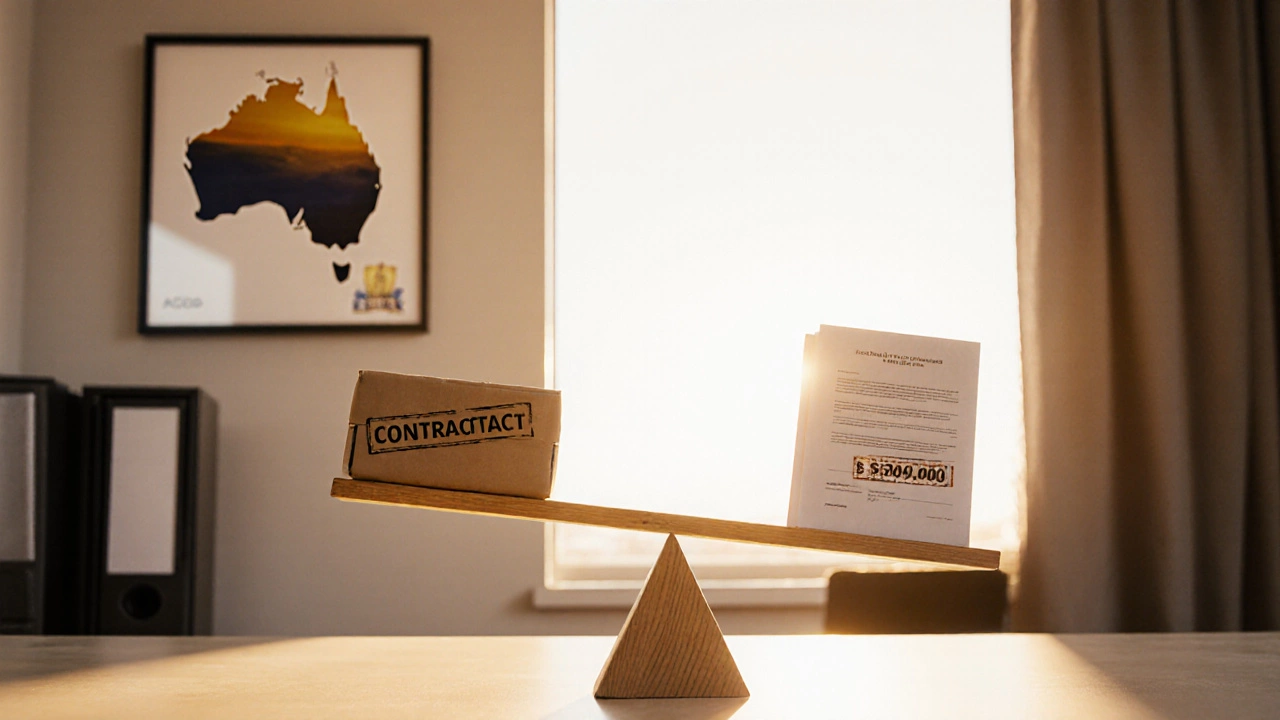Australia's Unfair Trade Rule Checker
Check if Your Contract Falls Under the Unfair Trade Rule
Enter the contract value and the type of party involved to see if the contract is subject to the unfair trade rule.
Contract Value Thresholds
| Party | Maximum Contract Value | Result if Exceeded |
|---|---|---|
| Consumer | $40,000 | Terms above this amount are not assessed for unfairness. |
| Small Business | $300,000 | Terms above this amount are exempt from the unfairness test. |
Key Takeaways
- The unfair trade rule is part of the Australian Consumer Law and protects consumers and small businesses from harsh contract terms.
- It applies to contracts worth $40,000 or less for individuals and $300,000 or less for small businesses.
- Enforcement is handled by the Australian Competition and Consumer Commission (ACCC), which can order terms to be removed and levy penalties.
- Businesses can avoid breaches by reviewing contracts, using clear language, and seeking legal advice before signing.
- If a term is found unfair, courts can rewrite it, but the contract remains enforceable for the fair parts.
When you sign a contract, you expect the terms to be fair and balanced. In Australia, the Unfair Trade Rule is a provision of the Australian Consumer Law that bans contract terms deemed harsh or one‑sided for consumers and small businesses. This rule exists to stop powerful companies from slipping clauses into agreements that leave the ordinary buyer with little choice.
The Australian Competition and Consumer Commission (ACCC) is the government agency responsible for enforcing the unfair trade rule. If the ACCC finds a breach, it can order the offending term to be removed, require changes to future contracts, and impose fines that can reach up to $1.1million for corporations.
Where the Unfair Trade Rule Comes From
The rule sits inside the Australian Consumer Law (ACL), itself a schedule to the Competition and Consumer Act 2010. The ACL was introduced to give consumers a national set of rights, replacing a patchwork of state laws. Section 23 of the ACL specifically outlines what makes a contract term unfair.
Who Is Protected?
Two groups benefit from the rule:
- Consumers - individuals purchasing goods or services for personal use.
- Small businesses - defined by the Australian Competition and Consumer Commission as enterprises with an annual turnover of $10million or less.
Large corporations are excluded; they must rely on competition law rather than the unfair trade rule.

When Does the Rule Kick In?
The ACL sets clear monetary thresholds. A term is only examined for unfairness if the total value of the contract falls within these limits:
| Party | Maximum contract value | Result if exceeded |
|---|---|---|
| Consumer | $40,000 | Terms above this amount are not assessed for unfairness. |
| Small business | $300,000 | Terms above this amount are exempt from the unfairness test. |
If a contract sits under the relevant threshold, every term - even the tiny print - is vulnerable to scrutiny.
What Makes a Term Unfair?
The ACL lists five “characteristics” that can render a term unfair. A term doesn’t need to hit all five; meeting just one is enough:
- It creates a significant imbalance in the parties’ rights and obligations, favoring the business.
- It is not reasonably necessary to protect the legitimate interests of the business.
- It would cause the consumer or small business to suffer detriment if applied.
- It is not a term that the consumer or small business could have reasonably understood or expected.
- It is a term that the ACCC has identified as a ‘blacklist’ clause (e.g., unilateral price changes without justification).
Typical examples include hidden fees, automatic renewal clauses that can’t be cancelled, and ‘take‑it‑or‑leave‑it’ terms that lock a buyer into a service for an indefinite period.
How the ACCC Enforces the Rule
The ACCC can act in two ways:
- Investigations - The commission monitors markets, reviews consumer complaints, and can launch formal investigations if it suspects a breach.
- Legal action - The ACCC may take businesses to the Federal Court or Federal Circuit Court. Courts can declare unfair terms void, order the removal of offending clauses, and levy penalties.
Legal outcomes often include a “remedial order” that forces the business to amend all existing contracts that contain the unfair term. This means the rest of the agreement stays valid; only the unfair part disappears.
Steps to Ensure Your Contracts Are Fair
Businesses of any size can dodge costly breaches by following a simple checklist:
- Identify the contract type - Is it a consumer agreement or a small‑business contract? Check the value against the thresholds.
- Audit existing terms - Look for clauses that limit liability, impose unilateral changes, or force long‑term commitments without clear exit options.
- Use plain language - Avoid legal jargon that a typical buyer can’t understand. Simpler language reduces the risk of being deemed “unreasonable”.
- Seek legal advice - Have a qualified lawyer review any clause that could be seen as protective but may overreach.
- Document the business need - If a term is necessary (e.g., to protect IP), keep evidence of why it’s essential. This can be a defence if the ACCC investigates.
- Provide clear cancellation routes - Offer an easy way for consumers or small businesses to end the agreement without excessive penalties.
Following these steps makes it far less likely that the ACCC will flag your contracts as non‑compliant.

What Happens If You’re Found in Breach?
Should the ACCC succeed in a case, the consequences can be severe:
- Financial penalties - up to $1.1million for corporations, $220,000 for individuals.
- Reputational damage - news of a breach can erode consumer trust.
- Contractual disruption - you may need to re‑draft all existing contracts, which can be costly and time‑consuming.
Businesses often mitigate these risks by voluntarily updating contracts before an investigation, a practice the ACCC encourages because it shows good faith.
Real‑World Example
In 2023, a major telecommunications provider was fined $5million after the ACCC found its standard terms forced customers into a 24‑month lock‑in with no clear way to exit. The offending clause also imposed a $200 early termination fee that was deemed “significant imbalance”. After the ruling, the company rewrote its contracts, introduced a simple online cancellation portal, and offered a 30‑day cooling‑off period for new sign‑ups.
Quick Recap of the Most Important Point
unfair trade rule is designed to keep the playing field level for everyday buyers and small enterprises, ensuring that no hidden clause can trap them into a disadvantageous deal.
Frequently Asked Questions
Does the unfair trade rule apply to digital subscriptions?
Yes. If the subscription agreement is under $40,000 for an individual or $300,000 for a small business, every term - including auto‑renewal and cancellation fees - must pass the unfairness test.
Can a large corporation challenge the unfair trade rule?
No. The rule is limited to consumers and small businesses. Large firms are subject to competition law instead.
What’s the difference between an unfair term and a misleading advertisement?
An unfair term is a clause inside a contract that creates an imbalance, while a misleading advertisement is a false statement about a product or service made before a contract is signed. Both fall under the ACL but are handled differently.
How can I check if my existing contract breaches the rule?
Start by comparing each clause against the five unfair‑characteristic tests. If you’re unsure, a brief legal audit (often offered by industry bodies) can flag risky terms before the ACCC steps in.
What penalties can a sole trader face?
A sole trader can be fined up to $220,000 for a breach. The penalty amount depends on the severity and whether the breach was intentional.
